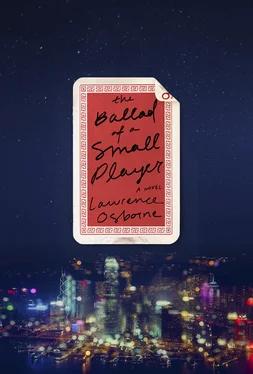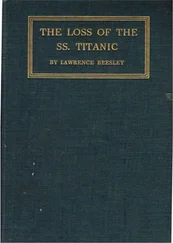Imust have been so exhausted that I fell asleep as soon as I was off my feet. The room filled with cloying steam and she broke the edge of a cake of oolong into a cast-iron pot, the tea bursting into fragrance as she broke it up. She went to the French windows and opened them slightly, enough to admit a finger of air. It wasn’t cold, just sea-damp and breezy. It cut through the steam. I could hear the rain. It looked set to rain for days, for weeks even, and already it had that even tempo that lulls you to sleep. The steady quiet rain of nightmares. I remember thinking, My pockets are empty, what if she searches them and realizes? But she must have already understood everything and that was what astonished me. I could no longer be of any interest to her. A sugar daddy with no sugar isn’t much of a daddy.
I stretched out on the tatami and for some reason it was warm, as if the floor was heated. I felt immensely tired. I lay on my side while she took off my shoes. She removed them very carefully, unrolling the socks and laying them to one side. There was a sponge, and she began sponging my feet with hot water. She took off my wet clothes, folding them and laying them down next to the shoes. The sponge dipped into a bowl of hot water and she sponged the backs of my legs, the small of the back, the arms, the calves, the shoulders.
When the tea was ready we drank it quietly. “Drink,” she said. “You’re dehydrated.” I slept again. The wind soughed as it swept through a thousand trees. I watched her beetle-shell hair drift over the edge of the cup and then over her forearms, where the sleeves of a Shetland sweater had been pushed back. The watch had been removed, stowed away. She opened a packet of McVities chocolate biscuits and we dipped them into the oolong, then nibbled the soft edges. I noted the TV set standing on a small plaster column and the boxed writing paper sitting on top of it. To whom did she write letters by hand? There was not a single photograph in the place, no trace of family or affections, and there was no sign that other lives were present within hers. There was just the view through the window and a painting of a monastery on a postcard slipped behind the corner of a wall-mounted mirror, a place that might have been familiar to her. It must have been Sando.
Before long I was stretched out on the tatami again, now with a quilt over me, and I was sleeping long and hard, a response in all likelihood to total disintegration, the last remnants of pride and coherence swept away. It was a ragged, formless unconsciousness. Even inside it I could relish the exhaustion. The rustle of the rain and the sound of the wind rolling down the hillside. When I woke it must have been hours later and I sensed that I was alone. It was night. I saw at once a candle lit inside a stone box and a saucer of oil placed on top of it whose aroma had filled the room. She had left it there while I slept and the flame had run low. I saw, too, that the window view had filled with far-off lights, the lamps around the plaza and the string of restaurants, the cement villas with their doors covered with stickers of good-luck cats. I got up and went to the kitchenette, where a note written in English lay on the table suggesting that I was to help myself from the fridge but wait till she got back later that night before making myself something proper to eat. She was going to bring something special from the city. I went out onto the balcony and tried to imagine where I was. I looked down at the muddy road, where dogs stood under a lamp wagging their tails and waiting. The trees writhed, the field of bright green bamboo rippling and seething. The house next door was shuttered down in darkness, the windows sealed with metal blinds. I turned on the heater and wrapped myself in the quilt. An hour went by and I grew restless. I always do. I put on my shoes and went downstairs to the locked door of the lower level that she had asked that I not open. I tried the handle but it wouldn’t yield. I peered through the crack. All I saw was the streetlamp filtering through onto a concrete floor. At that moment, moreover, I heard distant footfalls and I knew that it was her. I crept back upstairs and took off my shoes again, laying them against the door.
Dao-Ming came up the stairs with a box of goose eggs, some food in take-out boxes, and a bottle of Yellowtail wine. She was in a waterproof motorcycle jacket and goggles and her hair was wrapped in a see-through plastic bag, which she tore off as she laid the items down on the kitchen bar. She smiled when she saw me huddled in the quilt and told me she had bought goose eggs to make me feel better and fried wontons and other things that were reputed to be restorative. We made a little dinner out of it. I ate the goose eggs cracked into a glass and whisked with soy milk. Then the wontons. I hardly noticed the storm now lashing the house, the cables singing outside. She made us gin and tonics, with the rinds of lemons cut like fingernails. The wine was for later.
She was relaxed, which she wouldn’t have been after a client. Perhaps she had not had one. We sat around the low table and ate the last two uncooked eggs, breaking them and separating the whites and the yolks into the two shells and drinking them one after the other. She talked as slowly as a woman can talk, her vowels dragged out as she gave her sentences weight, and her thoughts sat upon them like tiny riders upon horses who don’t use bits or spurs.
She said, “You slept for a whole day, a whole night. I’ve never seen a man sleep like that.”
“I’ve never slept like that.”
She sipped her gin and tonic.
“I have been thinking. It was so remarkable to see you at the Intercontinental. When I saw you I thought — I thought you were a ghost. It was as if you were dead. You were dead and I had come across you all the same.”
“I wasn’t quite dead,” I said.
“But almost, no?”
“I crashed at the tables. I burned out.”
Was that death of sorts?
She took off her slippers.
“That’s how I know that look.”
“All gamblers—”
“Yes, you burn out.”
“I lost it all,” I said. “Everything. Everything.”
“You have to forget all the money you’ve lost.”
I told her how much it was.
“It’s all right,” she replied. “I’ve heard of worse.”
“But other men are millionaires,” I said.
“It doesn’t matter if they are. They can lose everything, too.”
“Yes.”
“You couldn’t pay at the hotel. I know.”
I laughed.
“If you hadn’t been there—”
She smiled.
“You’d be washing the dishes.”
I’d be deported , I thought.
And yet, I wanted to say, I couldn’t help myself. I was compelled.
“I just want you to eat,” she said.
“All right, I will. Sihk faan .”
She made some soup with squid, and we got drunk on the gin. The squid so fresh a spoon could scoop it. She brought out a lemon cake from the fridge.
“You made a mistake,” she went on. “It’s a very simple thing to do. One can change, however.”
I didn’t say anything, because I don’t believe in change. We are who we are; a loser loses. She cut the cake and made me eat a slice off her hand.
“It’s not the mistake you think. You made a mistake thinking I didn’t know. You can’t hide your desperation. You don’t have to hide your desperation.”
She ate the cake as well, and she said she had a bottle of rum intact.
“Disgusting but good. Shall we?”
She laughed, covering her mouth.
“I was sure you are an alcoholic,” she went on. “You behave like one. Alcoholics always lie about their problems.”
Читать дальше












